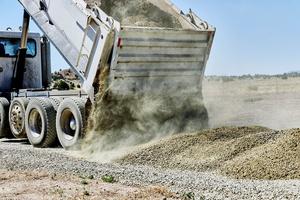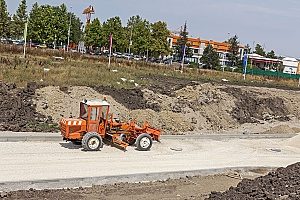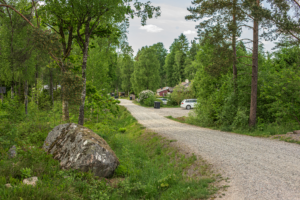All You Need to Know About Gravel Driveways: Benefits, Maintenance, and Design Ideas
 Are you tired of the same old concrete or asphalt driveways? Looking for a unique and cost-effective alternative? Look no further than gravel driveways. These driveways have gained popularity for their rustic charm, low cost, and easy maintenance. Whether you want to boost your home’s curb appeal or create a charming pathway, gravel driveways offer a versatile solution that fits many design styles.
Are you tired of the same old concrete or asphalt driveways? Looking for a unique and cost-effective alternative? Look no further than gravel driveways. These driveways have gained popularity for their rustic charm, low cost, and easy maintenance. Whether you want to boost your home’s curb appeal or create a charming pathway, gravel driveways offer a versatile solution that fits many design styles.
In this guide, we’ll explore everything you need to know about gravel driveways. We’ll discuss the benefits of choosing gravel, like its excellent drainage and ability to handle heavy loads. We’ll also cover maintenance tips to keep your driveway looking great and offer design ideas to enhance your outdoor space.
So, if you’re ready to discover the beauty and practicality of gravel driveways, join us as we delve into this timeless landscaping option. Whether you’re a homeowner or a decorator, this article will give you the insights you need to create a stunning and functional gravel driveway.
Benefits
Gravel driveways offer many benefits, making them an attractive choice for homeowners and landscapers alike. First, gravel provides excellent drainage. Unlike concrete or asphalt, gravel allows water to pass through, reducing the risk of pooling and flooding. This is especially useful in areas with high rainfall or heavy snowfall, preventing water buildup and ice formation.
Gravel driveways are also durable and long-lasting. Gravel can handle heavy loads, making it ideal for driveways used by cars, RVs, and trucks. Plus, gravel is less likely to crack or heave compared to traditional paved surfaces. With proper maintenance, a gravel driveway can last for many years, offering a reliable solution for your outdoor space.
Additionally, gravel driveways have a unique and appealing look. The natural texture and colors of gravel create a rustic ambiance that fits various architectural styles, from traditional farmhouses to modern homes. By choosing the right type and size of gravel, you can customize your driveway to match your style and landscape.
Types of Gravel for Driveways
 When selecting gravel for your driveway, there are several options to consider. Each type has its own benefits, so choose the one that best suits your needs and preferences.
When selecting gravel for your driveway, there are several options to consider. Each type has its own benefits, so choose the one that best suits your needs and preferences.
Crushed stone is a popular choice for gravel driveways. It is made by crushing larger rocks into smaller, angular pieces. Crushed stone is durable and compacts well, making it great for high-traffic areas. It comes in various sizes, from small pea gravel to larger pieces, allowing you to customize your driveway’s look.
River rock is another common option. It features smooth, rounded pebbles that create a natural and streamlined appearance. Although river rock may not compact as tightly as crushed stone, it provides a stable and long-lasting surface.
For a more uniform look, consider decomposed granite. This finely crushed granite creates a smooth, compacted surface. It is popular in contemporary or minimalist designs, offering a sleek and polished appearance.
Your choice of gravel will depend on your preferences, property needs, and design goals. Consulting with a landscaper or driveway specialist can help you select the best gravel for your project.
Design Ideas for Gravel Driveways
Gravel driveways offer a versatile canvas for creative design. Whether you’re aiming for a rustic or modern look, there are many design ideas to explore. One approach is to use different sizes and colors of gravel to add visual interest. For example, use larger gravel as the base and finer gravel for accents. This creates a striking contrast and adds depth to your driveway. Another idea is to incorporate decorative elements like stone borders or edging. This frames the driveway and creates a polished look while containing the gravel.
Natural Materials
Use natural stone, concrete, or metal for the edging. For a unique touch, consider creative patterns or designs. Arrange the gravel in patterns like herringbone or radial, or add decorative stones for a standout look. These elements can turn a simple driveway into a focal point. Lastly, integrate your gravel driveway with the landscape. Complementary plants, such as ground covers or shrubs, can soften the edges and create a cohesive look. Lighting, like path lights, can enhance the visual appeal, especially at night.
The Installation Process
 Installing a stone driveway requires careful planning. Follow these steps to ensure a long-lasting and functional result. First, prepare the site by clearing vegetation and leveling the ground. This creates a stable base. Next, lay down a geotextile fabric to prevent weeds and promote drainage. Add a minimum of 4 inches of compacted stones, choosing the right type and size for your needs. Ensure the stones are evenly distributed and compacted. Finally, add any desired edging to contain the stones. Proper edging helps prevent stones from spilling onto lawns or gardens. Pay attention to drainage, sloping the driveway to direct water away from your home. Working with experienced professionals can help ensure your stone driveway is installed correctly.
Installing a stone driveway requires careful planning. Follow these steps to ensure a long-lasting and functional result. First, prepare the site by clearing vegetation and leveling the ground. This creates a stable base. Next, lay down a geotextile fabric to prevent weeds and promote drainage. Add a minimum of 4 inches of compacted stones, choosing the right type and size for your needs. Ensure the stones are evenly distributed and compacted. Finally, add any desired edging to contain the stones. Proper edging helps prevent stones from spilling onto lawns or gardens. Pay attention to drainage, sloping the driveway to direct water away from your home. Working with experienced professionals can help ensure your stone driveway is installed correctly.
Maintainence and Care
Installing a crushed rock driveway requires careful planning. Follow these steps to ensure a long-lasting and functional result. First, prepare the site by clearing vegetation and leveling the ground. This creates a stable base. Next, lay down a geotextile fabric to prevent weeds and promote drainage. Add a minimum of 4 inches of compacted crushed rock, choosing the right type and size for your needs. Ensure the crushed rock is evenly distributed and compacted. Finally, add any desired edging to contain the material. Proper edging helps prevent the crushed rock from spilling onto lawns or gardens. Pay attention to drainage, sloping the driveway to direct water away from your home. Working with experienced professionals can help ensure your crushed rock driveway is installed correctly.
Common Issues and Troubleshooting
ile gravel driveways are low-maintenance, you may encounter a few common issues. Understanding these problems and addressing them can ensure your driveway’s success. Weed growth is a common issue. Regular weeding or using a weed barrier can help. Gravel displacement can create uneven surfaces. Regular raking and replenishing can fix this. Pooling water can be due to poor drainage. Re-grade the driveway or add drainage features to solve this. Potholes or ruts from heavy traffic can be repaired by filling and compacting the affected areas. Regular cleaning helps prevent the accumulation of dirt and debris, maintaining a tidy appearance.
Cost Considerations for Gravel Driveways
Gravel driveways are generally more affordable than concrete or asphalt. The cost depends on the type and quantity of gravel, labor, and equipment.
Larger or coarser gravel may be more expensive. Labor costs vary depending on whether you hire a professional or do it yourself. Ongoing maintenance costs, like raking and weeding, should also be considered.
Gravel driveways are durable and less likely to require frequent repairs, offering long-term savings. They also reduce water-related issues, saving potential costs. Consult local specialists for an accurate estimate based on your needs.
Comparing Gravel Driveway to Paved Options
When comparing gravel driveways to paved options, gravel stands out for several reasons. Gravel driveways cost less to install and maintain. They also provide better drainage, reducing water pooling and ice formation. Unlike concrete or asphalt, gravel is less likely to crack or heave due to temperature changes. With proper upkeep, gravel driveways can last many years, making them a cost-effective and durable choice.
DIY Installation Guide
Installing a gravel driveway yourself can be a rewarding project. Start by clearing the area of vegetation and leveling the ground. Lay down a geotextile fabric to prevent weeds. Add a base layer of large gravel and compact it. Then, add smaller gravel on top and compact again. Ensure the driveway slopes for proper drainage. With these steps, you can create a functional and attractive gravel driveway.
Seasonal Maintenance Tips
 Maintaining your gravel driveway through the seasons is essential. In spring, rake the gravel to redistribute it evenly. Add new gravel if needed. In summer, control weeds by pulling them or using herbicide. In fall, clear leaves and debris to keep the surface clean. During winter, remove snow carefully to avoid displacing gravel. Spread sand for traction if ice forms. Regular maintenance keeps your driveway looking great year-round.
Maintaining your gravel driveway through the seasons is essential. In spring, rake the gravel to redistribute it evenly. Add new gravel if needed. In summer, control weeds by pulling them or using herbicide. In fall, clear leaves and debris to keep the surface clean. During winter, remove snow carefully to avoid displacing gravel. Spread sand for traction if ice forms. Regular maintenance keeps your driveway looking great year-round.
Choosing the Best Gravel for Your Region
Choosing the right gravel for your region is important for driveway longevity. In areas with heavy rainfall, select larger gravel that provides better drainage. For regions with harsh winters, choose durable gravel that withstands freeze-thaw cycles. Consider local gravel types to blend with the environment. Consult a local expert to determine the best gravel for your specific climate and needs.
Landscaping Ideas to Complement Driveways
Enhance your gravel driveway with thoughtful landscaping. Plant low-growing ground covers along the edges for a seamless look. Use shrubs and flowers to add color and texture. Install stone or brick edging to contain the gravel and define the driveway. Adding lighting along the driveway improves safety and highlights the landscape. These ideas create a cohesive and attractive outdoor space.
Enhancing Gravel Driveways with Lighting
 Adding lighting to your gravel driveway boosts both safety and aesthetics. Install solar-powered path lights along the edges for an eco-friendly option. Use low-voltage landscape lights to illuminate the driveway and surrounding areas. Consider motion-sensor lights for added security. By strategically placing lights, you create a welcoming and well-lit entryway to your home.
Adding lighting to your gravel driveway boosts both safety and aesthetics. Install solar-powered path lights along the edges for an eco-friendly option. Use low-voltage landscape lights to illuminate the driveway and surrounding areas. Consider motion-sensor lights for added security. By strategically placing lights, you create a welcoming and well-lit entryway to your home.
Preventing and Fixing Common Driveway Issues
Prevent common gravel driveway issues with regular maintenance. Rake the gravel to keep the surface even and redistribute displaced gravel. Control weed growth with a weed barrier or herbicide. Fix potholes by filling them with fresh gravel and compacting it. Ensure proper drainage by maintaining the driveway slope. Addressing these issues promptly keeps your driveway in top condition.
Comparison with Other Types of Driveways
When choosing a driveway material, compare options like gravel, concrete, asphalt, and pavers. Concrete driveways are durable and long-lasting but can be expensive. They may face drainage issues and are prone to cracking. Asphalt driveways are more affordable than concrete and easy to maintain. However, they can weather and damage more easily.
Paver driveways offer a customizable and visually appealing option. They allow for creative patterns and better drainage but can be costly and require more maintenance.
Stone driveways stand out for their excellent drainage, affordability, and low maintenance. They are customizable and environmentally friendly, making them a practical choice for many homeowners.
Some Thoughts
 Gravel driveways are a practical and cost-effective alternative to traditional paved surfaces. They offer excellent drainage, durability, and a unique aesthetic. By choosing the right type of gravel and following proper maintenance practices, you can enjoy a beautiful and functional driveway for years to come.
Gravel driveways are a practical and cost-effective alternative to traditional paved surfaces. They offer excellent drainage, durability, and a unique aesthetic. By choosing the right type of gravel and following proper maintenance practices, you can enjoy a beautiful and functional driveway for years to come.
This guide has covered the many benefits, types, design ideas, installation process, and maintenance tips for gravel driveways. Whether you’re a homeowner or a decorator, these insights will help you create a stunning and lasting gravel driveway.
Incorporating Gravel Driveways into Sustainable Landscaping
Gravel driveways are not only cost-effective but also contribute to sustainable landscaping practices. The permeable nature of gravel allows rainwater to filter through, reducing runoff and helping to recharge groundwater. By incorporating gravel driveways into your landscape, you create an eco-friendly solution that blends seamlessly with natural surroundings. Additionally, gravel driveways require fewer resources to install and maintain compared to traditional paved surfaces. This makes them an environmentally responsible choice for homeowners looking to minimize their carbon footprint while enhancing their outdoor space.
Expert Gravel Driveway Services: MD, VA, and DC Metro
Ready to transform your driveway with gravel? Our expert team serves Maryland, Virginia, and the Washington DC metro area. We provide top-notch gravel driveway installation, maintenance, and design services. Contact us today to enhance your home’s curb appeal and functionality. Let us create a durable, attractive driveway tailored to your needs. Reach out now to schedule your consultation and experience the difference our professional services can make.
Summary

Dirt Connections was started with one goal in mind: providing quality residential and commercial construction services to clients on time and on budget. Reach out for more information on how we can support your next project.
For your convenience our estimates are free and by appointment. Call 703-940-9949 for a free estimate today!









































